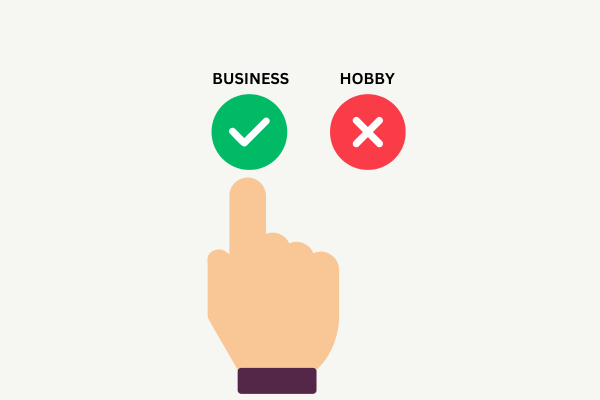
When you’re passionate about something, it’s easy to lose track of time—and money—pursuing it. But if that passion starts bringing in cash, it’s time to ask yourself: Is this a hobby, or have I inadvertently become a business owner? The IRS takes this distinction seriously, and so should you, especially if you want to stay on the right side of tax laws and avoid any surprises come tax season.
💡 The IRS Wants to Know: Hobby or Business?
The IRS has clear guidelines to help you determine whether your side gig is a hobby or a business. If you’re treating it like a business, they expect you to show it. This includes maintaining accurate records, dedicating time and effort to make it profitable, and relying on the income it generates. On the other hand, if your activity is more about personal enjoyment and not about making money, it might be classified as a hobby.
📌 Here are some key factors the IRS considers:
- ✅ Businesslike Manner: Are you keeping track of your income and expenses, and do you have a plan to make a profit?
- ✅ Effort and Time: Are you investing significant time and effort into this activity, indicating that your goal is to make it profitable?
- ✅ Dependence on Income: Do you rely on the income from this activity to support your lifestyle?
- ✅ Personal Motives: Are you doing this because you enjoy it, or because you’re aiming to turn a profit?
- ✅ Other Income Sources: Is this activity funded by income from other sources?
- ✅ Profit History: Have you made a profit from similar activities in the past, and do you expect to in the future?
- ✅ Adjustments for Profitability: Are you changing how you operate to try to make more money?
- ✅ Expertise: Do you have the knowledge to run this activity successfully as a business?
- ✅ Profit Consistency: Does the activity make a profit in some years? Can you reasonably expect future profits from the assets involved?
No single factor will determine your classification; the IRS looks at the entire picture.
❓ Why This Matters for Your Taxes
If your activity is classified as a business, you can deduct business expenses, which can reduce your taxable income. But if it’s a hobby, the rules are stricter, and deductions are limited. Misclassifying your activity could lead to issues with the IRS, including penalties.
🚩 Setting Yourself Up for Success
Whether you’re just starting out or have been at it for a while, proper planning is key to success. Every business is unique, so your budgeting should be too. Start by clearly defining your long-term goals—where do you see yourself a year or five years from now? Once you have that vision, you can create a budget that aligns with your goals, ensuring you spend money wisely to support your business growth.
Unsure whether your passion is a hobby or a business?
2024 could be the year your passion project takes off. But if it does, be ready for the IRS to take notice. Understanding whether you’re running a business or indulging in a hobby can save you a lot of headaches—and potentially a lot of money—down the line.
If you’re unsure whether your passion is a hobby or a business, or if you need help getting your finances in order, let’s chat. Our team of tax experts is here to help you navigate the IRS’s rules and set you up for success in 2024 and beyond. Don’t leave your tax situation to chance—reach out today and turn your passion into a profitable venture with confidence.
